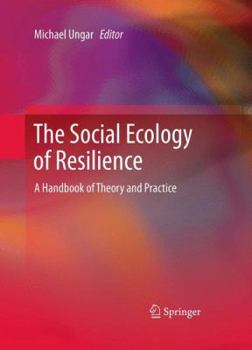The Social Ecology of Resilience: A Handbook of Theory and Practice
Select Format
Select Condition 
Book Overview
More than two decades after Michael Rutter (1987) published his summary of protective processes associated with resilience, researchers continue to report definitional ambiguity in how to define and operationalize positive development under adversity. The problem has been partially the result of a dominant view of resilience as something individuals have, rather than as a process that families, schools, communities and governments facilitate. Because resilience is related to the presence of social risk factors, there is a need for an ecological interpretation of the construct that acknowledges the importance of people's interactions with their environments. The Social Ecology of Resilience provides evidence for this ecological understanding of resilience in ways that help to resolve both definition and measurement problems.
Format:Paperback
Language:English
ISBN:1461480922
ISBN13:9781461480921
Release Date:June 2013
Publisher:Springer
Length:463 Pages
Weight:1.75 lbs.
Dimensions:1.1" x 7.0" x 10.0"
Customer Reviews
0 rating





